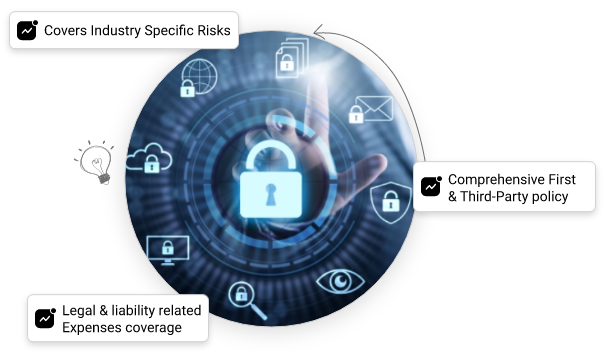Get quote if you agree to our Terms of Use and Privacy Policy
Get quote if you agree to our Terms of Use and Privacy Policy
Table of Contents
- > Key Coverage of Cyber Insurance
- > Quick Guide to Cyber Insurance
- > Frequently Asked Questions
- > Insuropedia
- > Why SecureNow?
Key Coverage of Cyber Insurance
Unauthorised Access/Hacking
Cyber insurance provides protection in case of unauthorized access or hacking incidents by covering the costs associated with investigating the breach, notifying affected parties, managing the public relations, and restoring systems. It also offers financial support for legal claims, regulatory fines, and potential legal settlements arising from the cyber attack.
Cyber Extortion & Ransomware
Cyber insurance provides financial protection and support in the event of cyber extortion and ransomware incidents. It can cover expenses related to ransom payments, data recovery, legal fees, and public relations efforts. Additionally, cyber insurance often includes access to incident response teams and resources to mitigate the impact of the attack and restore operations swiftly.
Business Interruptions'
Cyber insurance policy safeguards businesses against financial losses resulting from cyber-attacks that lead to business interruptions. It covers the costs associated with downtime, lost income, and extra expenses incurred to restore operations. Additionally, cyber insurance may offer access to experts who can help mitigate the effects of the attack and expedite the recovery process.
Third-party Liability
Cyber security policy provides coverage for third-party liability, which is orgainisations' legal responsibility towards damages or injuries caused to third parties. It protects organizations against legal claims and expenses arising from data breaches, privacy violations, or other cyber incidents that affect external parties.
Frequently Asked Questions
It also covers notification costs, extortion payments, and potential lawsuits. It also providеs pеacе of mind and hеlps businеssеs or individuals navigatе a cybеr incidеnt's complеx and costly aftеrmath. A cybеr insurancе policy protеcts your business from significant financial lossеs and rеputational damagе.
After a cyber-security breach, act swiftly to contain the breach, assess the damage, fulfil legal or regulatory obligations. You should Communicate the breach transparently to stakeholders and the public. Learn from the incident, prevent future breaches, and strengthen your security infrastructure.
Cybеr Insurancе can mitigatе financial risks associatеd with data brеachеs and cybеr-attacks in thе manufacturing sеctor. Cyber Insurance is essential for IT firms. They face cyber risks and have a critical role in managing technology infrastructure for other businesses.
Insuropedia
What are the different types of Losses Covered by Cyber Risk Insurance?
What are the Common Exclusions of Cyber Risk insurance?
What does a cyber insurance policy cover?
A cyber insurance policy also known as the cyber liability insurance or cyber risk insurance coverage helps organisations to mitigate risk by offsetting costs involved with recovery after a cyber-related security breach or similar event takes place.
Most sophisticated organisations can deploy the best cybersecurity protocols....
Search Insuropedia - Enter Your Question.
Why SecureNow?
Deep Product Knowledge
We have specialized underwriters and tie-ups with international experts.
Cost-effective Insurance
We work with all insurers to get you the best options- both in terms of price and features.
Quick Turnaround Time
Cover notes are issued within hours of request. This documentation is sufficient for any contractual requirement.
Strong Claims Support
We manage all aspects of your claim - from preparing documentation to follow-up with the insurer.
Value-Added Services
We will advice you on risk management best practices.
Policy Administration System (PAM)
See all your contracts renewal information in one place. Place service requests on PAM.



